Mickey Smith, Jr.: Grammy Nominated Sax Mam, Music Teacher, & Children’s Book Author
Story By Justin Morris • Photos By Elizabeth Medwick
You know, I didn’t come from an explicitly musical family. I was inspired by the music my parents enjoyed and pursued it ravenously as I got older. I chased all of those musical endeavors that a young man could chase via the offerings of the Calcasieu Parish School System in the mid to late 1990s. As I got older, I started to gravitate towards the musicians around me. One stood out when I was a young man of 16.
He was a co-worker at the first job I ever had. We’d make and bag hamburgers on the clock, and I would listen to him sit and play his saxophone (a favorite instrument of mine as a child) on our breaks.
It just knocked me out to listen to him play. All these years later, I’m still not as good in any musical capacity as he was back then. He has not only gotten better, but has also become a prominent name on the local music scene; returned to his school band roots to serve as the band director of Maplewood Middle School; written and illustrated his own book; and gotten the attention of the Grammy Awards twice.
Mickey Smith, Jr., is probably best known throughout the area as the charming and talented fella behind the Sax in The City concerts, now a decade strong. He spent a good deal of time last year revisiting some of his earliest artistic roots and breaking some completely new ground on the way.
The Adventures of Little Mickey: Keep on Going is the musician and educator’s first foray into the literary world. The story of his own musical journey is meant to help motivate and inspire young and old alike.
I was lucky enough to chat with my old buddy about where the idea of a children’s book came from and what led him to share that particular story.
SMITH: Well, it’s a result of what I do in the classroom. Everybody loves band at first until they realize it’s a lot of practice and work. What I find happens is that there’s a lot of enthusiasm and motivation at the beginning, but ultimately, it’s your habits that keep you going and make you successful. So, I try to paint a picture for them that shows… that nobody’s just great at anything at first, even “Mr. Smith.”
I started out with the squeaks and the squawks and the frustration. I’m just trying to show them I’m a real person, and I tell them the story about how, when I started, my first sounds were amazingly terrible, and my mom encouraged me with these simple words: “Son, I see something special in you. I don’t know exactly what it is, but I know if you keep on going, you’ll be successful.”
And the kids are like, “oh, that’s nice …” Except the fact that my mom actually opened up the front door and she told me to keep on going; meaning, it sounded so bad, you’ve got to take that noise outside. (Laughs.) You got to keep on going. (Laughs.) It kind of brings a little levity to it.
They laugh, they think that they kind of get it. They get a picture of, “Okay, his first sounds were not the best sounds.” As I continue telling that story, it goes with me being in the driveway and my mom telling me again, “keep on going,” and then I go down the driveway, and she tells me “keep on going” until eventually [I] ended up in the woods across the street, and that’s where I would practice.
I remind the kids that your first sounds may not elicit the response you’re expecting, but if you keep on going [you’ll advance]. For me, the woods were a place of elevation and isolation, but now [my continued work has] put me in a position where there’s celebration, but it happened because I didn’t give up. I didn’t quit. And eventually the very door that I was sent out [of] was the door that was opened back up to me, and my parents invited me, and they said, “come on in.” And I tell the kids that meant so much to me because with everything that I’ve been recognized for, that open door means as much to me as anything that I’ve ever experienced. Because my parents were saying, “We love you, we see you, and we value you.”
I tell you that whole story because … here’s the part that’s crazy for me. A lot of these kids are now grown. They’re in their twenties, or whatever. And I’ll go places, and they still remember the story. These kids come up and they’re like, “Mr. Smith, can you, can you tell my friend and I that story?”
Man, I think back on middle school and, I don’t know how you were, but I don’t remember a whole lot vividly. So when a kid remembers something from 11 years old … that is of significance and value. So, it just got to the point where enough of these kids were coming back as adults telling me how much the story meant to them that I said, “You know what, this needs to be captured. I need to share this in a powerful way with others.”
So, Mickey set to the task of doing just that. Given that the sharing of this story happened in the classroom, a children’s book seemed a great avenue to help stir up some old creativity in Mickey.
SMITH: What a lot of folks don’t know about me is before music, I was a visual artist. That was the first passion. But I just kind of fell in love with music, man … actually, right about the time that you and I met. So this book provided me a beautiful opportunity to come back to something that I had stepped away from, and that was the illustrations. So that really came from a special place.
Now for me, I’ll be able to share something that a lot of folks don’t know about me in the sense that I’ve got this visual element, as well. It really came together to make this, I think, a very heartfelt story. When you read this, you feel like it’s something more than just [a] children’s book because this message speaks to everybody. If you don’t give up, if you don’t quit, if you just keep on going, there’s no limit to what you can do. That’s a message that our young and young-at-heart need, especially in this day and age where everything is so instantaneous and so quick that we often lose that powerful essence of perseverance and persistence and patience. Those are all qualities that continue to need to be developed, and that’s what this story outlines.
Not only is Smith expanding artistically locally, he’s also finding himself on the national stage once again as one of the 10 finalists for the Grammy Music Educator of the Year award for the second consecutive year. Even though he’s no stranger to the nomination, he says that it’s still just as unbelievable now as it was a year ago.
SMITH: This thing is surreal. I was telling my wife about the process, and she reminded me of a conversation I had with her a while back. I shared with her how when I was a kid, I dreamed of it. Man, I say a kid … Dude, like Burger King years! (Laughs.) Like when I was screwing up the orders in drive thru because nobody [could] hear over my sax, I was dreaming. (Laughs.) I always dreamed that I would win a Grammy, you know?
As a kid, that’s what you do. Your imagination runs, and nobody tells you “no” yet, you know, so you just dream big. All these years later, I’m going to be honest, I put that on the back burner. Reality kicked in, you know? Adulting, right? (Laughs.) But middle school band directors from a little town in Louisiana don’t win Grammy’s, you know what I mean? So, to have this opportunity here again … you know, the dream could come true. I’m speaking in kind of declarative speech now so don’t take it as arrogance … I just believe that you gotta believe, man … So, having said that, when I win this Grammy, (laughs), it’s not just for me, man. This is gonna be super cool, but it’s also going to be an opportunity for me to go back to my classroom and tell my kids that anything is possible.
A few years back, I told my kids that if you work hard and if you keep on going, then all your dreams can come true, and that your sound, not just the music, but “your sound” can place you before kings and queens. That’s something my grandmother used to say. I think it’s a scripture, but she would often say that to me.
Fast forward to this time last year … some of my former students sent me a picture … about 12 of them … and they said, “Mr. Smith, you were right.” The McNeese State University Band went and did the parade in London, and one of the last stops they did was [perform] … for the Queen of England.
And I was like, man, this was another time that you forget how much they can remember. It had been at least six years since I told those kids that… maybe 10. But they remembered it. And I think that this Grammy thing would be another beautiful opportunity to show kids and to show the community what’s possible when you believe; when you discover your sound; and when you don’t give up; and when you keep on going — because I’m telling you man, this is huge. This is a game changer right here.
While most folks out there are familiar with the Grammy Awards, many might not be that familiar with the Music Educator’s award itself. Smith tells us that, unlike the categorized awards we all know, the Educator’s award goes to just one person culled from over 4,000 submissions.
SMITH: Back in February, there [was] a window of opportunity where educators [could] be nominated. Now, the nominations can come from basically anyone, and you are nominated by someone, typically from your community … [who] sees the work and the value and believes that it needs to be recognized. So, out of those, I think they choose about 2,500 that will be in the pool, so to speak. [It’s] a great honor just for them to accept you.
At that point, you are asked to submit some information, and from that information they cut it down to … I don’t even know the number … I’m going to say a thousand people. From that, they cut it down again, and, typically in June, the quarterfinalists are named. That’s only 200 people. Those 200 then have to submit evidence, artifacts, videos … all this stuff to legitimize your standing and for them to select who will go to the next round. In October, they select the semifinalists, which is the top 25, and now we are at the finalists.
In December, roundabout the same time that they announce the music nominees, they also named the top 10 music education finalists, and that’s where I’m at. Those individuals were featured on CBS This Morning a couple of weeks ago.
At this point, I tell folks, if nothing else happens, you’re a winner because you actually do receive something. My school receives a thousand dollars to go into the school fund, which is very nice. And a representative from the Grammy’s will come down to our school at some point this year, after all the dust settles and the winner is [named], to make a formal presentation.
At this point, it’s just the waiting game. There’s nothing I can do. No one can vote. It’s not American Idol. (Laughs.) It’s just wait and see. Now, the good news is if they select you, then you’re not like all these music people that go to the Grammy’s not knowing if they win or not. You already know you’re a winner. So that’s the good news. But the bad news is they only pick one person. But I’m believing, man. I’m believing this year is going to be the year, and it would just be an amazing thing.
So, to win would mean you’d go to the Grammy’s; your school gets $10,000, which [is] a win. It would mean that you are a special guest of the Grammy’s and you go to the entire Grammy week. Two days before the televised Grammy’s, there’s a presentation specifically for the music educator of the year, and they honor you that day and recognize you. And then you would actually be on the Grammy show on that Sunday as well. We won’t know until the last week in January, so fingers crossed. They don’t give you much time. But I tell you this, I mean they don’t have to, really. I think if you win… even if you [have] plans that second week in February, I think you change them.
But, Grammy or no, Mickey has big plans for 2019, including not only finding ways to enrich and bolster students but educators as well.
SMITH: 2019 is, I guess you can call it a coming out party of sorts. Everything that I’ve been working on… it’s never been singularly about the music. It’s about helping others. It’s about enrichment. It’s about helping people find their way. And that’s what music does. I think that’s what education does, too.
So, I have something I’m calling Mickey Smith Jr. Enrichment and Solutions. And what I do with that is take a motivational mixture of music and message and go into schools and help teachers. I pour into teachers because so many resources in schools have been poured into the students, and rightfully so. But often [what is] lacking is the teachers and they’re the very people that have to pour into others. But you can’t pour into somebody if you haven’t been poured into yourself.
So, by doing this, I’m bringing enrichment and solutions, showing them how to successfully navigate what I call a sound 180 days of school, which we call the “Sound 180.” So, that’s one thing that I’m doing. I’m also taking my message into schools, churches and community groups.
It’s basically what I’ve always done. If you’ve come to a Sax in the City show, you’re feeling the enrichment. You leave feeling better because it’s not just about a song. We want to give you something that’s going to last after the song is over.
That’s why this book is so important. This book is a message that will last a child for a lifetime. It’s a gift they can open up again and again and again. I also have some other books that I’m authoring right now … more or less devotionals … meant to help educators as well.
So, there’s a lot of things I’m going to be using, because I see music is a powerful thing. But I also think that there’s a message that needs to be heard in this season: a message that I’ve learned as being part of this community. They’re lessons that I taught and lessons that I caught, man. Some of them came from being in the classroom, but some of them just from being a part of this thing we call Southwest Louisiana. There’re some things that we learn each and every day because of the folks that we have right here, and that’s what it’s all about.
After a decade plus of performing, educating and being a positive influence in our community, Mickey Smith’s charm, charisma and desire to help others remains undiminished.
Whether or not we get to see him “Live from Los Angeles” in February, people like Mickey should be celebrated and embraced by all of us here in Southwest Louisiana, not just as a musician or an educator, but also as a person: one of spirit, compassion and love. He truly is a local treasure, and I hope that I can safely say that we will be rooting him on all the way to the Grammy stage.
Best of luck, Mick. Go win one for all of us, brother.



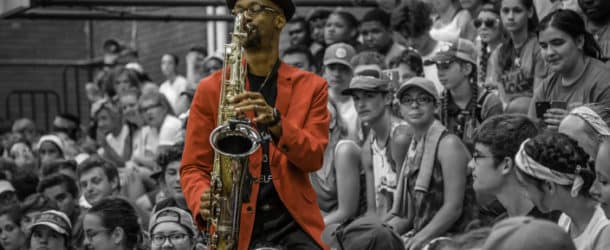
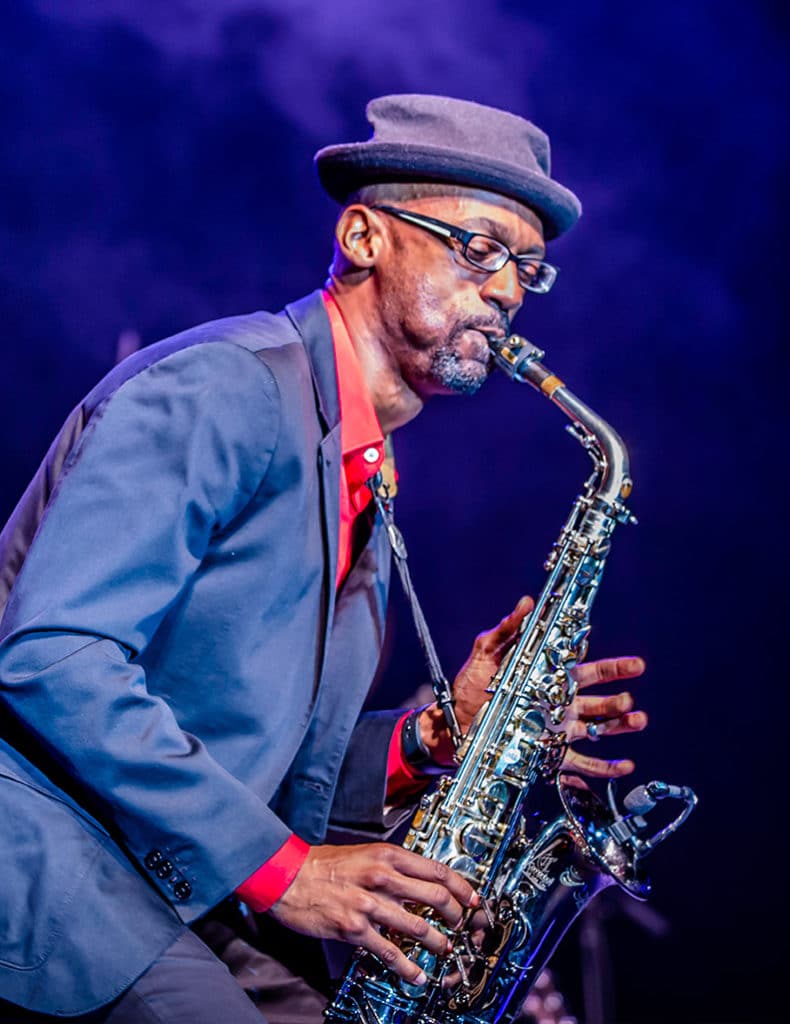
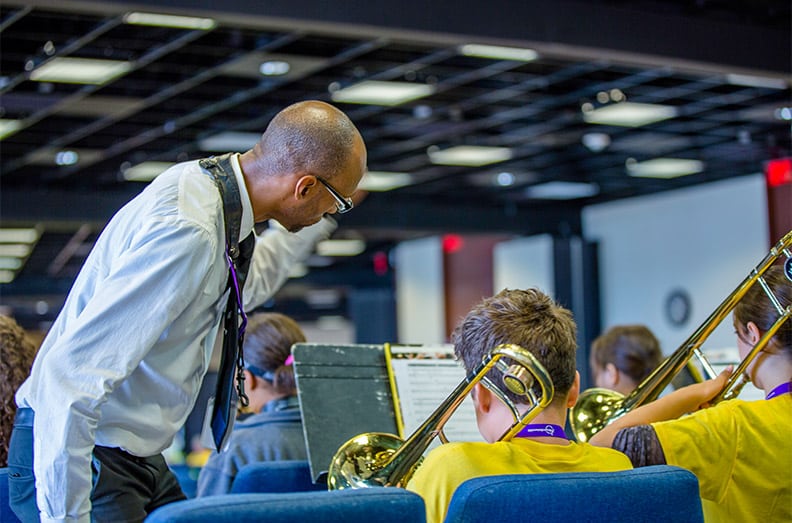
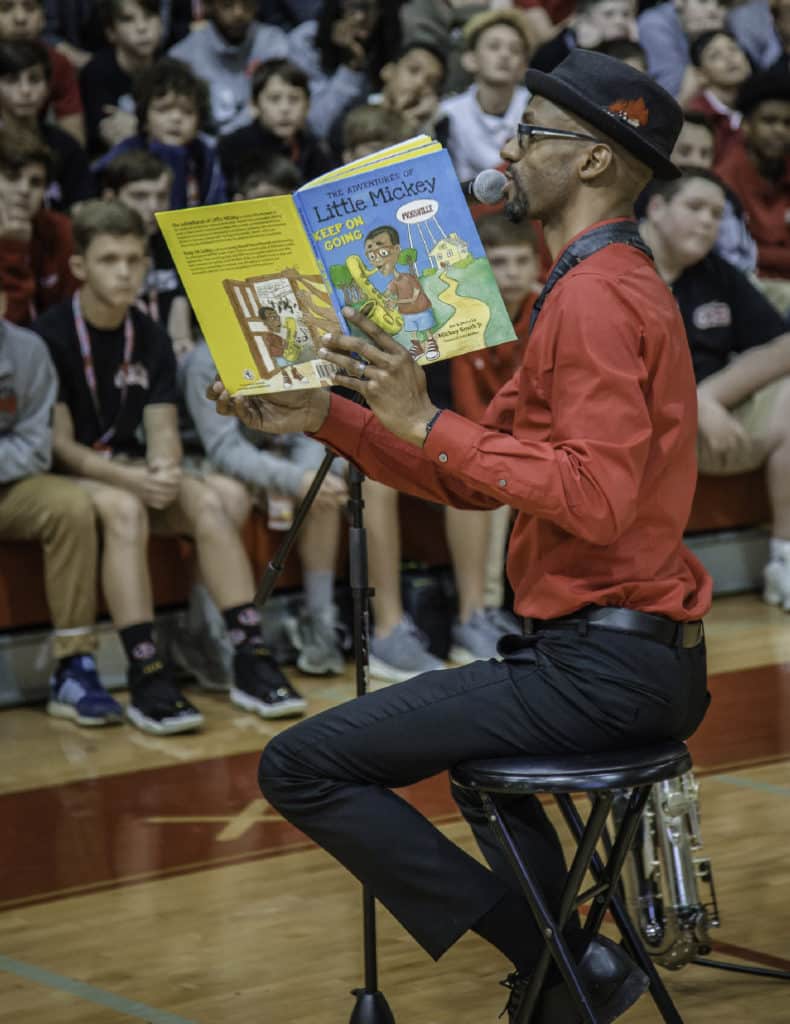
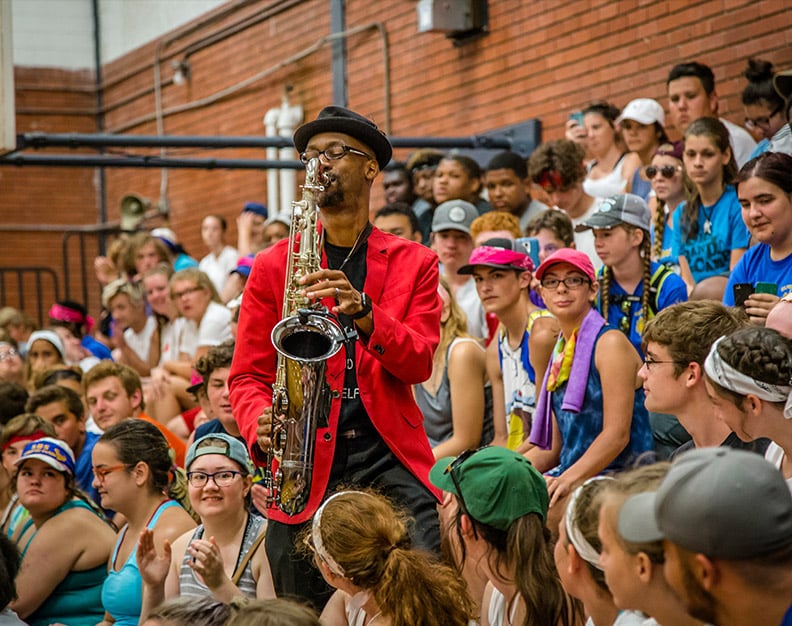











Comments are closed.